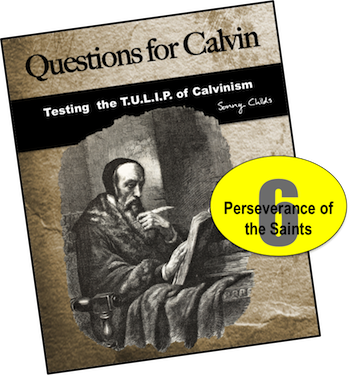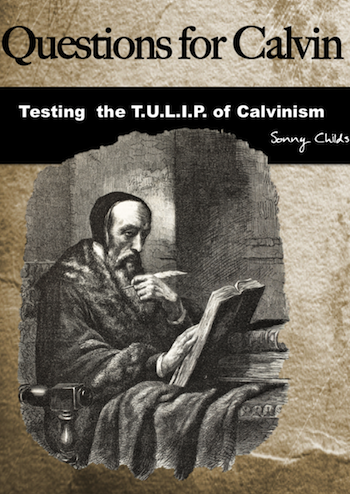Questions for Calvin: P is for Perseverance of the Saints

Note: T.U.L.I.P. is an acronym often used to summarize the five core doctrines of Calvin, Total Depravity, Unconditional Election, Limited Atonement, Irresistible Grace, and Perseverance of the Saints.
In the Words of Calvin:
John Calvin (Institutes 2.5.3; Calvin 1960:320)
"For perseverance itself is indeed also a gift of God, which he does not bestow on all indiscriminately, but imparts to whom he pleases. If one seeks the reason for the difference–why some steadfastly persevered, and others fail out of instability–none occurs to us other than that the Lord upholds the former, strengthening them by his own power, that they may not perish; while to the latter, that they may be examples of inconstancy, he does not impart the same power."
Like all other areas of his doctrine, Calvin believed and taught that humanity had no freewill power to preserve salvation. Just as it was awarded without choice, it is preserved without any effort on the part of the receiver. According to Calvin, humanity is without responsibility.
In the Words of God:
2 Peter 2:20-22 (NIV)
"If they have escaped the corruption of the world by knowing our Lord and Savior Jesus Christ and are again entangled in it and are overcome, they are worse off at the end than they were at the beginning. It would have been better for them not to have known the way of righteousness, than to have known it and then to turn their backs on the sacred command that was passed on to them. Of them the proverbs are true: 'A dog returns to its vomit,' and, 'A sow that is washed returns to her wallowing in the mud.'"
Q: If Perseverance
of the Saints means "once saved always saved," what was Peter talking
about in these verses? What did the Holy Spirit mean when He warned that if a
person "escaped the corruption of the world" then was "again
entangled in it" and "overcome" that he would be "worse
off" than at the beginning? How is it possible for people to escape the
corruption of the world then "turn their backs on the sacred command"
without that meaning they were once saved but lost their salvation? Why does He
use such graphic illustrations of walking away from salvation, ("A dog returns
to its vomit"), if losing one's salvation isn’t a graphic possibility?
A: Please don't misunderstand, the Lord did say, "My sheep hear my voice, and I know them, and they follow me: And I give unto them eternal life; and they shall never perish, neither shall any man pluck them out of my hand. My Father, which gave them me, is greater than all; and no man is able to pluck them out of my Father's hand." (John 10:27-29, NIV) Certainly no other human power has the ability to rob us of our salvation. But does this passage mean that we cannot remove ourselves from His hand? If we are unable to make the freewill choice to turn our backs "on the sacred command" (NIV), why does Paul give that exact warning in 2 Peter 2:20-22, above? Only by submitting to the harmony of these passages can the whole counsel of God be truly discovered.
2 Corinthians 11:2-3 (NIV)
"I am jealous for you with a godly jealousy. I promised you to one husband, to Christ, so that I might present you as a pure virgin to him. But I am afraid that just as Eve was deceived by the serpent’s cunning, your minds may somehow be led astray from your sincere and pure devotion to Christ."
Q: If Perseverance
of the Saints means it is impossible to walk away from salvation, why did the
Holy Spirit inspire the Apostle Paul to write these words? Why illustrate the
seriousness of their condition with the earliest possible example of human
departure from God's protection? Why express concern that they might be
"led astray" from a "devotion to Christ" if it is not
possible to walk away from a devotion to Christ?
A: Please don't
misunderstand, Paul also said, "For I am convinced that neither death nor
life, neither angels nor demons, neither the present nor the future, nor any
powers, neither height nor depth, nor anything else in all creation, will be
able to separate us from the love of God that is in Christ Jesus our
Lord." (Romans 8:38-39, NIV) But does this list exclude our own freewill
choice to separate ourselves from the love of God? Eve made that freewill
choice when she acted rebelliously toward the command of God. And, in our
passage above (2 Corinthians 11:2-3), Paul is clearly concerned that his
Christian readers will be "led astray" by choosing to act just like
her. Only by submitting to the harmony of these passages can the whole counsel
of God be truly discovered.
Galatians 5:4 (NIV)
"You who are trying to be justified by the law have been alienated from Christ; you have fallen away from grace."
Q: If Perseverance
of the Saints means it is impossible to fall from grace, what was Paul saying
when he wrote this passage to the Christians of Galatia? Why did the Holy
Spirit inspire him to tell Christians they have been "alienated from
Christ" if they were once saved, always saved? Why did he come right out
and say, "…you have fallen away from grace" if they couldn't fall
from grace? You have to be in a place before you can fall from it. Obviously,
they had been in grace at one time (once saved), but had fallen away from grace
(not always saved).
A: Please don't
misunderstand, Paul did say just a few verses earlier, "It is for freedom
that Christ has set us free." (Galatians 5:1, NIV) But just a few verses
later he also said, "You were running a good race. Who cut in on
you to keep you from obeying the truth? That kind of persuasion does not come
from the one who calls you." (Galatians 5:7-8, NIV) Please notice two
things from this follow-up passage. 1. It is possible to be "running a
good race" and have someone "cut in on you." 2. Not everyone who
is called by God responds appropriately to His calling. Some who are called
choose to ignore God's call and respond instead to the "persuasion"
of the one who "cut in." Conclusion: Just because we are called, it
does not necessarily mean we are saved. Only by submitting to the harmony of
these passages can the whole counsel of God be truly discovered.
Additional Passages for Further Study:
Galatians 1:6 (NIV)
"I am astonished that you are so quickly deserting
the one who called you to live in the grace of Christ and are turning to
a different gospel."
Galatians 5:7-8 (NIV)
"You were running a good race. Who cut in on you
to keep you from obeying the truth? That kind of persuasion does not come
from the one who calls you."
Hebrews 2:1-3 (NIV)
"We must pay the most careful attention,
therefore, to what we have heard, so that we do not drift away. For
since the message spoken through angels was binding, and every violation and
disobedience received its just punishment, how shall we escape if we ignore so
great a salvation?"
Hebrews 6:4-6 (NIV)
"It is impossible for those who have once been
enlightened, who have tasted the heavenly gift, who have shared in the Holy
Spirit, who have tasted the goodness of the word of God and the powers of the
coming age and who have fallen away, to be brought back to repentance.
To their loss they are crucifying the Son of God all over again and subjecting
him to public disgrace."
Hebrews 13:9 (NIV)
"Do not be carried away by all kinds of
strange teachings. It is good for our hearts to be strengthened by grace, not
by eating ceremonial foods, which is of no benefit to those who do so."
Application:

There can be little unity among Christians as long as human doctrines dominate and selective obedience governs hermeneutics (principles for interpreting Scripture). Only by submitting to the whole counsel of God can we correctly handle the word of truth. We must raise our sights higher than the teachings of men.
2 Timothy 2:15, NIV
“Do your best to present yourself to God as one approved, a worker who does not need to be ashamed and who correctly handles the word of truth.”
I firmly believe that two of the greatest challenges facing the church today are Islam from without and Calvinism from within. In a world so devoid of personal responsibility, Calvin's doctrine of grace without responsibility is truly alluring. Young people are deserting biblical truth in alarming numbers. These false doctrines have permeated nearly every Christian denomination and must be addressed.
This important material can be covered in a seminar, Gospel meeting or revival format. For more information about this presentation, please visit our "Questions for Calvin" seminar page. This material is also available as an ebook through Amazon, Apple, Barnes & Noble and other formats. (Go to the "Books by Sonny" page for links to the other formats.)
Our children are at risk. It is my greatest prayer that you will find this information helpful in defending them against the false teachings of Calvinism.
Missed the first five lessons in this series? Go to:
Questions for Calvin: "Introduction"
"T is for Total Depravity"
"U is for Unconditional Election"
"L is for Limited Atonement"
"I is for Irresistible Grace"
For the final lesson in this series, go to:
Questions for Calvin: "Conclusion"
Back to Top of "Questions for Calvin"
Back to The Church Page
Back to Home Page

